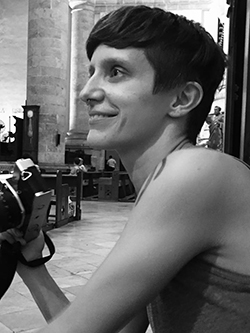
Guatemala Conference: Heather Vrana
USC Shoah Foundation Center for Advanced Genocide Research will host the international conference “A Conflict? Genocide and Resistance in Guatemala,” at the University of Southern California, Sept. 11-14, 2016. The scholars profiled in this series were each selected to present their research at the conference.
Heather Vrana’s presentation “H.I.J.O.S.: A New Politics and Memory Beyond Reconciliation” will focus on the next generation of activists in Guatemala.
Vrana, assistant professor of history at Southern Connecticut State University, researches youth, social movements, urban histories, and class formation in modern Central America, with particular interest in how political culture and violence shape class formation.
At the conference at USC Shoah Foundation, Vrana will share her research on transitional justice and her ongoing collaboration with Guatemala’s branch of H.I.J.O.S. (in English, Sons and Daughters for Identity and Justice against Oblivion and Silence). H.I.J.O.S. is an activist group that seeks trials and punishment for genocide perpetrators, participates in the defense of human rights and keeps alive the memories of the victims and those still fighting.
Vrana calls into question the current methods of justice-seeking that demand state recognition and cooperation, pointing to H.I.J.O.S.’s own updated slogan “We do not forget, we do not pardon, we do not reconcile.” She argues that this new grassroots praxis alters the terrain of genocide studies by proposing a new translocal frame for genocide, justice, and truth, including a counter-culture of affect and memory politics against reconciliation.
"It is time that we think more broadly about transitional justice."
“This perspective will also encourage us to think about different forms of justice, especially how calls for different forms of justice overlap, collide, or form new ways of understanding relationships between individuals and states,” Vrana said. “I hope we will think about the many tensions between popular understandings of justice and the court of law.”
Vrana noted that her fellow panelists blur the lines between “activist” and “academic” and she hopes to discuss what each of these roles signify in the fight for justice. She looks forward to engaging in conversations with the other scholars about earlier Guatemalan history and the more recent genocide in terms of both scholarship and activism.
“I anticipate that this conference will mark a new moment in thinking on genocide and resistance as we approach the anniversary of the end of the civil war and face the uncertainties of ongoing structural and political violence,” Vrana said. “It is time that we think more broadly about transitional justice and I am optimistic that change can begin with this committed group.”